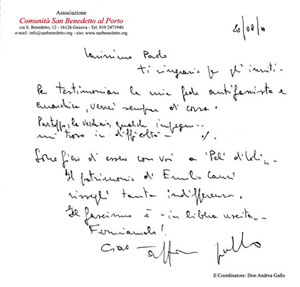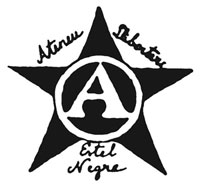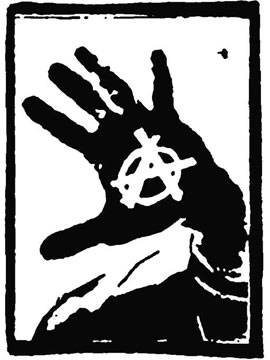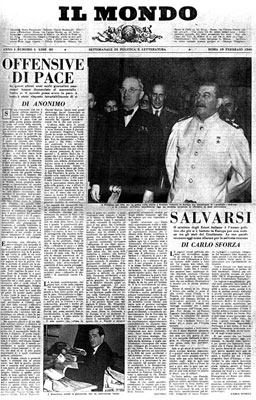Thus was born “A”
by Amedeo Bertolo
We were young
and a bit cocky.
We were young, definitely. The oldest was me: I was twenty-nine. The youngest, Paolo Finzi, he was nineteen. Other (Luciano Lanza, Fausta Bizzozzero, Nico Berti, Roberto Ambrosoli) were between twenty-five and twenty-eight years. I'm talking about the core of the founders of "A" in the fall of 1970 when the project was born of the magazine. Young and reckless: wisely reckless, given the results.
The project is born in a unique way, at the external stress to those that will be - that we will be - his actual promoters. A small Roman publisher proposes, through an aide (Guido Montana), to create a new anarchist publication. New and different. The Montana also suggests the title: "A", a graphically circled. Our initial misgivings about the project and on the title and then acceptance. While preparing the first issue, devising graphic designers and journalists, the publisher has a change of heart (probably found too amateurish and anarchists for his taste) and leaves the project. What to do? Give up? Continue? With what ability, with what money? Rashly and wisely we decide to be capable of and go on it alone. And we decide to use a nest egg set aside over the past two years for a project - deadlocked - a libertarian common, barely enough to cover the printing costs of the first three issues of the journal. Then we'll see, Bakunin send us a good fate.
The old Bak sends us good. Printed ten thousand copies, "A" immediately sells seven-eight thousand copies, making it by far the most popular anarchist publication. The formula that scrambling a bit 'programmatically a little' experimenting, we adopted worked, it was appropriate to the times, times of youth revolt and intense social conflict (we were close to the '68 of the Students and '69 of the workers) and unexpected rediscovery of anarchism (also paradoxical effect of the affaire Piazza Fontana).
The formula? A current layout (current then, of course), a current language, current content (or made current). A little 'mirror of the struggles and some' critical thinking, with a little wider thinking, a bit' of innovative theoretical proposals (those of the Federated anarchist groups - GAF - which the magazine referred to, but not be wanting to be the official expression) and a bit reproduction of proud anarchist identity ...
We were young and a little cocky. At least that's the presumption perhaps necessary to make us believe capable of restoring youth to an anarchism that we perceive as senile, repetitive, tired and rhetorical, a vulgate that betrayed the potential of anarchism classic ...
I left the editorial duties of "A" at the end of 1974, having designed and made its transition to the new graphics and editorial magazine format, to engage in other cultural and publishing initiatives: the international journal of anarchist research "Interrogations", the Centro Studi Libertar G. Pinelli, the Edizioni Antistato… , in pursuing other, more or less the same project together openly innovative identity and who had given birth to "A".
Anti-fascist and
anarchist Faith
by don Andrea Gallo

Instead of an essay, of our young (though the register does not agree) Genoese friend priest we publish a note sent to our editor who had invited him to participate in a "partisan party" sponsored by the ANPI of Piacenza August 29, 2010 in Peli di Coli, Piacenza on the Apennines of Piacenza.
The party was held in front of the church that, during the Resistance, saw Emilio Canzi, anarchist, commander of Partisan Area XIII, take part with the role of primary responsibility for the armed struggle against the Nazi fascists, aided also by the pastor of the church in the mountains, Don Bruschi.
We transcribe what is written by Don Gallo:
“Dear Paolo, thank you for the invitation. To bear witness to my anti-fascist and anarchist faith, I would be coming always in a hurry. Unfortunately, old age, some commitment ... I am in difficulty. I am proud to be with you in Peli di Coli. The heritage of Emilio Canzi should revive so much indifference. Fascism is "free raining". Let's stop it! Hello. Andrea Gallo.”
What are useful for
the anarchists?
by Andrea Papi
Does it still makes sense to spend yourself for an idea such as the anarchist?
 From a utilitarian point of view, to no avail. Indeed! As for profits, profits and income, current gods whose power rests on the overall evolution of the world, they are a safe risk of loss. As reflected in the anarchists accounts perpetually in the red. From the perspective of inner well-being of a disenchanted and creative doing, intellectual and aesthetic perspective open and irreducible to any canonization from above, instead they are certainly no panacea. If treated the right way, in fact, anarchism is able to offer amazing miraculous ability to uplift the spirit, because it helps you acquire a keen ability to independently look at the world, at once futuristic and realistic.
From a utilitarian point of view, to no avail. Indeed! As for profits, profits and income, current gods whose power rests on the overall evolution of the world, they are a safe risk of loss. As reflected in the anarchists accounts perpetually in the red. From the perspective of inner well-being of a disenchanted and creative doing, intellectual and aesthetic perspective open and irreducible to any canonization from above, instead they are certainly no panacea. If treated the right way, in fact, anarchism is able to offer amazing miraculous ability to uplift the spirit, because it helps you acquire a keen ability to independently look at the world, at once futuristic and realistic.
The real question is whether it still makes sense to spend ourselves for an idea like that anarchist, mocked and regarded as unrealistic by the dominant culture, so that those who embrace it is easy destined for a kind of unwanted hermitage intellectual and ideal. Against this prevailing conformism I say very strongly that not only it makes sense, but it remained the only sensible idea that proposes a way of being and living a radical alternative to the current degraded state of social, economic, political and existential situation.
Anarchy is the only remaining point of view, serious and poetic at the same time, able to free ourselves from this state of affairs, although its detractors continue to present it as the source of all chaos. But just look so disenchanted as it is (not) / running the world, increasingly subject to a multitude of laws, governments that impose the will of a few oligarchs at grabbing everything impoverishing everyone else, to realize that this is (not) / operating the true generator of a continuous structural chaos, a constant factor of increased confusion.
When most of humanity will realize that the financial accumulation, the politic imposition, labor and enslavement of human beings from control by self-validating elite, are the true causes of suffering and discomfort ever most common, then will rediscover the anarchist proposal and not considered neither far away nor out of reach. He will understand that his conditions of freedom, individual and collective cooperation, solidarity, non-hierarchical libertarians methods, are essential to find the right ways to start solving the ills from which it is afflicted.
On the new anarchism
by Andrea Staid
Anarchy must be built in our lived without waiting for the revolution.
Let's start with a basic concept, to define the new anarchism, or at least give my interpretation;
anarchism should be pluralistic, it can not be repeated the same all over the world, is not universal, and carries the concept of relativist.
 Anarchism must be tied to the context of its production, is changing, forever in transit, if you stop it becomes a dogma and would be destined to certain death.The anarchist thinking is programmatically unstable, does not seek rest, but becomes constantly. (Salvo Vaccaro) This said, it is clear that it is important to continue to assert, for example, that we want a world of free and equal, practice self-management, produce a clear and decisive message, but never say this in absolute terms, a message is built up, that changes in practice in everyday and the people.
Anarchism must be tied to the context of its production, is changing, forever in transit, if you stop it becomes a dogma and would be destined to certain death.The anarchist thinking is programmatically unstable, does not seek rest, but becomes constantly. (Salvo Vaccaro) This said, it is clear that it is important to continue to assert, for example, that we want a world of free and equal, practice self-management, produce a clear and decisive message, but never say this in absolute terms, a message is built up, that changes in practice in everyday and the people.
Clearly this view of anarchism and its practice makes it more complex and uncertain. The old anarchic security "of the anarchy that will come" fades, crumbles.
Anarchy must be built into our lives without waiting for the revolution, since there is only one great power to knock down a building to be conquered. Power, as Michel Foucault reminds us, does not occupies only a privileged place, nor depends on a single identifiable entity once and for all. The state, the laws, the social hegemonies are merely effects and manifestations of an institutional relations and power strategies. The power, however, is anonymously spread everywhere, is omnipresent and everywhere, "not because it encompasses everything, but because it comes from everywhere". The power coincides with the multiplicity of power relations, which in various ways are interwoven and contrasted. It is a relationship between individuals and the society is criss-crossed by power relationships: every social relationship is a relationship of power.
The key issue is the continued work among the people to combat domain, ie the system of power that is only monopoly of part of the society is needed to work long and deep to discredit the authority, to be able to break the asymmetries in the functional relations triggering the start of a low cultural mutation. Why tear down the state (admitted to figure out how to do) would not solve the problem of domination, exploitation of man by man, animals and the earth, without a profound cultural change work in networks of relationships between human beings you create a new domain only with a new dress, as has happened in every revolution of 900.
This is why the new anarchism has a strong focus this time should not be viewed as a break with the past and the history of the anarchist tradition, but as an actualization of the same.
It is important to recall here the words of Gustav Landauer: Anarchism is not what the future but the present, is not made of the claims but of life. A life that does not wait for the day of revolution, or rather sees the revolution as something in constant motion and open to change during its course.
As we wrote in the brief introduction to the booklet of the experimental laboratory (http://asperimenti.noblogs.org) on anarchism and post-structuralism, the new anarchism leads us to undertake a process of collective reflection and experimentation that comes from the common resolve of a fracture between what is the theory, the anarchist tradition we have inherited and practical attempts to solve and overcome the contradictions and conflicts that arise in today's society.
The libertarian South
and the challenge of modernity
by Angelo Pagliaro
The political bargaining in some South regions has been replaced by ethics of the real.
The libertarian presence in southern Italy has historically been characterized not so much as organized community groups but by prestigious individuals, well-loved but little inclined, as we would say today, "to make a group".
At the founding congress of the FAI in Carrara (1945), the South was represented by a large delegation representing various organized groups, which subsequently showed all their weaknesses and individuality as they returned to veteran trees soar in the individual geographic areas . There is, therefore, in the South, a tendency to individualism, a sort of natural, almost genetic, unavailable to the hypothesis organizational? I have no answer to these questions, I can only say that, thanks to the Internet, in the last decade, the relationship between communications and information technology with a variety of movement and individuals has improved a lot. The Indymedia are, in my opinion, an excellent example of "direct action production. But looking to the future I wonder what challenges we face is that enormous political wilderness that is the Italian left? No divine clouds will guide, with its shadow cast on the ground, the libertarian people towards the destination.
It will be the everyday approach with the issues considered important and how to dialogue with the people, the tactics for bringing people together in a new way to persuade and convince us of the goodness of our practices to avoid this negative phenomenon called "backyard". The post - movement is already taking on new characteristics as compared to the past, it deals with a wide range of contradictions: pollution, racism, public goods, psychiatry, etc.. and the attention of the militants (whether Marxist or anarchists) has shifted to a policy of daily life and the transformation also individual pursuit effects on individual axles and not tended, as before, to the realization of the dream of "conquest" of power. The political bargaining in some regions of the South has been replaced by ethics of the real, the "act politic".
The strongest and most frequent criticism that comes to us here in the South, not only from political opponents, but also from "friends" of the historic Left, is to intrude, sometimes, in folklore and being almost unable to create, to put it caught with a "genealogy of affinity." Well! It should not be offended by this criticism, in fact we have to thank, because we have to admit (being aware) that even from this depends the lack of power to shock the common powers.
The main effort, which we have to do in the coming years, in the direction exactly opposite to what we did thirty years ago. At that time we were fighting for the recognition of diversity in the context of common attributes, while today, in the pulverized galaxy of the Italian left, we need to work with greater otherness, education and respect for the recognition of common elements in the context of diversity.
From “Il Mondo” to “A”
by Antonio Cardella
Credit goes to the Failla, the Marzocchi the Mantovani, the Aldo Rossi, Sergio Costa, but also of the thousands of comrades, with tear-eyed with sleep ...
 LThe defeat of the peasant struggles in Sicily had stabilized in my existential condition a constant state of dull resentment which had certainly not improved my willingness to political confrontation and tolerance with respect to whom, as concerning those fightings, had shown to be lukewarm or even indifferent. So when I found myself unexpectedly to attend the environment of the employees of Pannunzio's Il Mondo, I wondered how I ended up in a calm environment at that time so far from my fury.
LThe defeat of the peasant struggles in Sicily had stabilized in my existential condition a constant state of dull resentment which had certainly not improved my willingness to political confrontation and tolerance with respect to whom, as concerning those fightings, had shown to be lukewarm or even indifferent. So when I found myself unexpectedly to attend the environment of the employees of Pannunzio's Il Mondo, I wondered how I ended up in a calm environment at that time so far from my fury.
I wondered that as I had been peering with an interest not only aesthetic that Upper Room in the Crocean round intent to convey the substance of the message of a moderate liberalism, even if also substantiated by a culture far from rough and with the careful use of language, as we wanted at all costs avoid the accusation on the one hand, very common in those times of "clerical-scelbismo" of ideological extremism and, secondly, of a reform of the trade that low mintage intransigence on principles with a misunderstood real politique practiced by some cynical and arbitratry left.
I spent some time deciphering the true nature of my curiosity about that world from me, at first sight, far away. The fact is that I was initially in talks with some occasional and fleeting characters of the "A" magazine, I found availability unknown at that time of ideological fury, the awareness of the danger of regime that hung over our country, and the urgency of an emergency pact that unify all the forces that might oppose the regime. This - they said Carandini, Manlio Rossi Doria and the same Pannunzio - to begin a path toward a aware and supportive free society.
So I remembered what Camillo Berneri had written in Sovietism anarchists and anarchy back in the thirties of last century:
- The history is opposition and synthesis. Anarchism, if it wants to act in history and become a big factor in history, must have faith in anarchy as a social opportunity, which is realized in its progressive approximations. Anarchism is more alive ... (of a truth of faith, ed), wider. More dynamic. It is a compromise between the idea and fact, between today and tomorrow. Anarchism is proceeding at a polymorphic, because it is in life. "
To some extent that Berneri lesson, but also of the Il Mondo, was an anarchist practice in the late sixties and served as State terrorism was unleashed on the anarchists from the massacre of Piazza Fontana. Then the editors of the Espresso (Camilla Cederna between everyone) and to some extent had picked up the baton of Il Mondo, they cope with the anarchists against the false reconstructions of the state. But not only in the sphere of information, including those in forensic and those publishing in the web of relationships that the anarchists had built helped to repel the attacks of government institutions.
From those terrible days, our press was more aggressive and timely manner. In close connection with the work of the "Comitato politico-giuridico di difesa" and with some lawyers that were always very close (I remember for all Giuliano Spazzali and Rocco Ven- tre) reconstructed events and personalities of the season of the massacres, significantly contributed to the mobilization throughout the national territory of an opposition which, although varied, always held in high regard the arguments of the anarchists. Credit goes to the Failla, the Marzocchi, of Mantovani, the Aldo Rossi, Sergio Costa, but also of a thousand comrades who, torn from their eyes with sleep, you would meet the night in the venues of Umanita' Nova, of L'Internazionale and of A Rivista Anarchicat just come to enrich the anarchist publishing.
I believe that this extraordinary climate of Anarchism is the lesson to achieve the decisive rejection of self and willingness to understand the reasons of those who, although still far from anarchy, can share with us parts of that path that we always approximates more to a truly libertarian society.
Art and Anarchy
by Arturo Schwarz
The artist is the esthetic dimension of the anarchist.
A work of art should possess three essential qualities. The first is the originality, pre-requisite for the work of art to extend our mental and visual horizons. But originality is not enough. In our technological age it is easy to come up with provocative innovations that, however, were soon rendered obsolete by later ones. On the contrary, what is truly original brings the promise of timeless value. The artist creates when he is motivated by an internal exacting drive which means he can not create "on commission", complying with a request of political or commercial character. This, leads to the second quality of the artwork.
In fact, a work of art, to be such, must be the result of an irresistible inner need. The artist must obey an urgent need cognitive and emotional, having always in mind the advice given by Polonius to his son Laertes: "This above all: be true to yourself" (Hamlet I: 3). But again, the emotional sincerity is not enough. The creative drive is not the prerogative of only the artists. A mentally unbalanced person can obey the same need, but not always his works have an aesthetic and expressive power.
The third quality is the most elusive, both to describe as it is to be acquired. The work of art must not only let us know about a new reality and be the result of an existential necessity, it must also enact poetic aura. "The object of the literary scene is not literature but literariness, that is, what gives each work a literary quality," as Jakobson recalls. Similarly, a work of art, is interesting not for its aesthetic quality, but for his poetic power that is what gives the most meaningful quality.
Recall also that, in developing a work, the artist goes - quite unconsciously - through the stages of very long way that should lead to enlightenment, ie, the level where the art is not utopia but it becomes an element of initiation and self-knowledge. The artist then reaches the state of clairvoyance, according to the requirement of Rimbaud. And it follows as he is inspired, gripped, that is, a solicitation of creative transpersonal and transrational nature . In fact, as Plato teaches, "no one who is in possession of reason reaches a inspired and true divinely."
Elsewhere I have defined the artist as the archetypal anarchist, in fact, anarchy is not, as we well know, synonymous with disorder, confusion, arbitrariness and irresponsibility (which are connatural to authoritarian systems, equally hostile to the individual and the community), but implies a higher order based on harmony and love. Anarchy is a state of mind. Each person can find out for itself in the only way possible, by their rejection of the principle of authority.
For this reason I think that the artist is a way of being of the anarchist because to create means to give birth to something that did not exist before. Each creator, starting from tabula rasa, rejects the principle of authority as well as any prior model. It therefore follows that, consciously or not, whoever is engaged in a creative activity is an anarchist. In fact, "artist" and "anarchic" are interchangeable terms, perfect synonyms. Anarchy is a form of existence of the artist, just as the movement is of the matter. In the same way in which the matter is the dimension of the movement, the artist is the aesthetic dimension of the anarchist.
All Translations by Enrico Massetti ("The other Fabrizio" + "Pinelli-Piazza Fontana")

